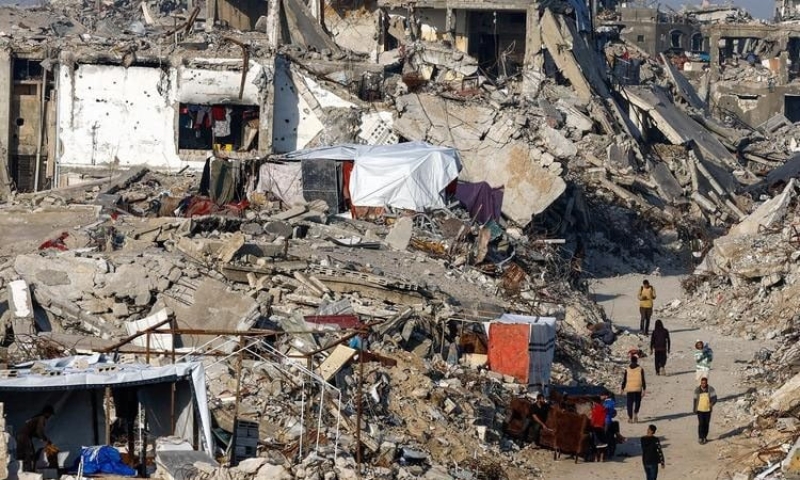- Dhaka’s air again turns ‘unhealthy’ Thursday morning |
- SC reinstates caretaker govt system in BD Constitution |
- Bangladesh can't progress sans women’s safety online & offline |
- U.S. trade deficit drops 24% in Aug as tariffs reduce imports |
Israeli Air Strikes Kill 27 in Gaza Despite Fragile Truce

Israeli air strikes on Gaza killed 27 people on Wednesday, officials in the Strip said, with both Israel and Hamas accusing each other of violating the fragile ceasefire in the territory.
The strikes were among the deadliest in Gaza since the truce took effect last month and came as Israel announced attacks targeting Hezbollah in Lebanon, despite a nearly year-long ceasefire there.
Fourteen people were killed in Gaza City in the north and 13 in Khan Yunis in the south, according to the territory’s civil defence agency, which operates under Hamas authority. Two hospitals confirmed the same toll.
The Israeli military said it carried out strikes on Hamas after militants fired towards an area where troops were operating in the south, calling it a “violation of the ceasefire agreement.”
Hamas denied the accusation, denouncing the attacks as a “dangerous escalation” that could undermine the truce, which has largely held since October 10 despite occasional flare-ups.
Ahraf Abu Sultan, 50, told reporters he had returned to his home in Gaza City with his family after being displaced in the south for a year.
“We barely managed to repair one room in our destroyed house just two days ago, and the bombing and deaths have started again. They don’t even give us a chance to breathe,” he said.
Fellow resident Nivine Ahmed said she had been chatting with a neighbour when Israel’s bombings “turned everything upside down in a second.”
“We heard the explosions and saw smoke rising. People ran as ambulance sirens wailed, carrying away the martyrs. Next time the missile could fall on us.”
Trump Peace Plan
Media restrictions in Gaza and difficulties accessing many areas mean the tolls and details from both sides cannot be independently verified.
The highest daily toll since the truce began was on October 29, when over 100 people were killed in Israeli strikes, according to civil defence figures and hospital data.
Israel has carried out repeated strikes on what it says are Hamas targets during the ceasefire, killing more than 280 Palestinians, according to Gaza’s health ministry.
The truce is based on a US-brokered deal that also included the return of the last 48 hostages held by militants to Israel. While living hostages were released early in the ceasefire, the bodies of three hostages still remain in Gaza.
The second stage of US President Donald Trump’s peace plan, involving disarming Hamas, setting up a transitional authority, and deploying an international stabilisation force, has yet to be implemented.
The UN Security Council voted Monday in favour of a US-drafted resolution endorsing the plan, though Hamas rejected it as failing to meet Palestinians’ “political and humanitarian demands.”
The war was sparked by Hamas’s October 7, 2023 attack on Israel, which killed 1,221 people. Israel’s retaliatory assaults on Gaza have killed at least 69,513 people, according to UN-verified health ministry figures.
Strikes in Lebanon and Syria Visit
Israel also carried out strikes in southern Lebanon on Wednesday, targeting Hezbollah weapons storage facilities and accusing the Iran-backed group of rebuilding its capabilities.
The raids came a day after 13 people were killed in a strike targeting Hamas members in a Palestinian refugee camp in southern Lebanon — the deadliest attack in Lebanon since the ceasefire took effect.
Also on Wednesday, Israel’s top leaders visited troops stationed inside Syrian territory in a buffer zone meant to separate the two countries’ forces.
Prime Minister Benjamin Netanyahu told the troops that their presence was of “immense importance” to Israel’s security.
The visit was sharply condemned by Damascus, which called it “a serious violation of Syria’s sovereignty and territorial integrity.”

